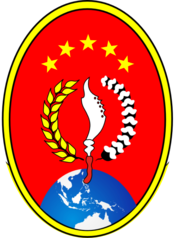President of Sunda Raya
| Sunda Raya |
 This article is part of the series: |
|
|
|
Guiding Ideology
Executive
Legislative
Government Policy
Elections and Referendums
2014 Election |
The President of the Democratic Republic of Sunda Raya, officially known as Presiden Republik Demokratik Sunda Raya, was the head of state, Supreme Commander-in-chief and holder of the highest office within the Democratic Republic of Sunda Raya. However, the president of Sunda Raya is not the head of government. The executive branch is held by a collective leadership subordinate to the Supreme Workers' Council.
The post is abolished during the enactment of new way policy in mid 2015. The current executive post is held by a collective leadership consisting of Regional Workers Council chairpersons from all federal entities. However, due to certain centralism issue, the highest executive post is held by the chairperson of the Supreme Workers Council de facto.
Election Process
Eligibility
The Constitution of Sunda Raya contains a modified form of term limits on holders of the office. However, it did not limit the total number of terms that a President may serve. This means a person could hold office as President for two or more consecutive terms.
Election
The president was elected by a direct popular election held nationwide. The election of the President was regulated by the Presidential Election Law and the Basic Electoral Law. The president was elected in a one-round system every two years.
Recallment
The president may be fired directly by the people if the president was unable to fulfill his duties, misused the people's mandate, or had broke his oath. The recallment procedure was regulated by the law and guaranteed by the constitution. The recallable or dismissable president means the president had no absolute power. The absolute power was on the hand of all peoples of Sunda Raya.
Duties and Powers
Domestic Policy
According to the Constitution, the President was not empowered to determine the full range of all objectives and targets of domestic policy, but only its basic guidelines. They are to be implemented both by the president himself and by the supreme soviet. The president had the rights to attend and to vote in the supreme soviet as the other citizen of Sunda Raya. Each year the President is required to address the supreme soviet regarding the situation in the country and the internal and foreign policy of the state.
Foreign Policy
The President alongside with the supreme workers council determined the position of Sunda Raya in international affairs and represented the state in international relations, conducts negotiations and signs ratification documents. The President alongside with the popular collective leadership of supreme workers council appoints and recall diplomatic representatives of the Sunda Raya to foreign states and international organizations.
Ceremonial Duties
An important ceremonial role of the President was awarding state awards. State Awards of the Democratic Republic of Sunda Raya are the highest form of official recognition given to individuals for service to the nation in the fields of defense, building socialism, economics, science, culture, art, education, health care, public safety, rights advocacy, charity, etc.
